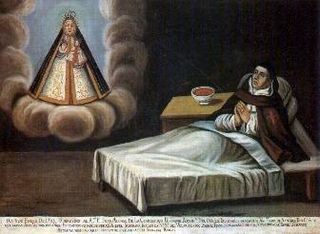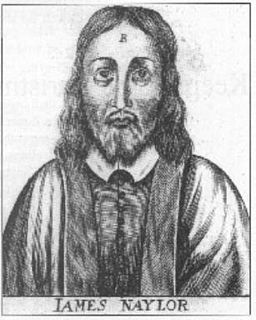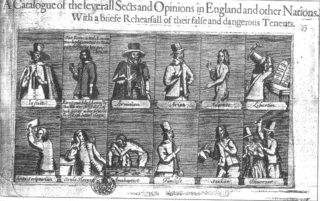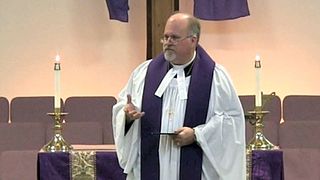Thomas Ellwood was an English religious writer. He is remembered for his relationship with poet John Milton, and some of his writing has proved durable as well.

Light of God, Light of Christ, Christ within, That of God, Spirit of God within us, Light within, inward light and inner light are related phrases commonly used within the Religious Society of Friends (Quakers) as metaphors for Christ's light shining on or in them. It was propagated by the founder of the Quaker movement, George Fox, who "preached faith in and reliance on 'inward light' ". The first Quakers were known to sit in silence and meditate on the words of the Bible until they felt the inward light of God shining upon them and the Holy Spirit speaking.

Margaret Fell or Margaret Fox was a founder of the Religious Society of Friends. Known popularly as the "mother of Quakerism", she is considered one of the Valiant Sixty early Quaker preachers and missionaries. Her daughter Sarah Fell was also a leading Quaker.

Elias Hicks was a traveling Quaker minister from Long Island, New York. In his ministry he promoted unorthodox doctrines that led to controversy, which caused the first major schism within the Religious Society of Friends. Elias Hicks was the older cousin of the painter Edward Hicks.
Francis Howgill was a prominent early member of the Religious Society of Friends (Quakers) in England. He preached and wrote on the teachings of the Friends and is considered one of the Valiant Sixty—men and women who were early proponents of Friends beliefs and who suffered for those beliefs.

Quakers are members of a historically Christian group of religious movements formally known as the Religious Society of Friends, Society of Friends or Friends Church. Members of the various Quaker movements are all generally united in a belief in the ability of each human being to experientially access "the light within", or "that of God in every one".
Lewis Benson (1906–1986) was perhaps the 20th century's greatest expert on the writings of George Fox. And although this expertise was widely acknowledged, he was also a voice crying in the wilderness, for he sought to herald a gospel greater than he to a body of modern Quakers with little taste for it. His appreciation of his situation is beautifully captured in a 1954 letter to his sister-in-law, which he wrote to decline her invitation to join an intentional community associated with a non-Quaker sect. He wrote, in part:
I have never been committed to the principles of 20th century Quakerism. I was aware almost from the beginning that the Quakerism of today has almost nothing in common with the Quakerism of Fox. I have taken my stand in the Society of Friends as the champion of a forgotten faith, and I have never taken a cynical or pessimistic view about the possibility that Friends might recover their rightful heritage. I have taken a stand and worked for a cause for nearly 20 years, but although I have accomplished nothing, I am not in the least discouraged….It is my firm belief that God has still a work for the Quakers to do and I want to help lay the foundations that will make that work possible.
Sir John Lowther, 1st Baronet was an English lawyer, landowner, and politician who sat in the House of Commons for Westmorland in 1628 and in 1660. He took no great part in the English Civil Wars.
George Whitehead (1636–1723) was a leading early Quaker preacher, author and lobbyist remembered for his advocacy of religious freedom before three kings of England. His lobbying in defense of the right to practice the Quaker religion was influential on the Act of Uniformity, the Bill of Rights of 1689 and the Royal Declaration of Indulgence. His writings are both biographical and ideological in nature, examining the Quaker way of life.

William Penn was the son of Sir William Penn, and was an English nobleman, writer, early Quaker, and founder of the English North American colony the Province of Pennsylvania. He was an early advocate of democracy and religious freedom, notable for his good relations and successful treaties with the Lenape Native Americans. Under his direction, the city of Philadelphia was planned and developed.
William Dewsbury was an English Quaker minister and religious writer in the early period of the movement. He was born in Allerthorpe, Yorkshire, around 1621. Little is known about his parents and education, apart from the fact that his father died when he was eight years old.

William Jenkyn (1613–1685) was an English clergyman, imprisoned during the Interregnum for his part in the 'Presbyterian plot' of Christopher Love, ejected minister in 1662, and imprisoned at the end of his life for nonconformity.
Benjamin Furly (1636–1714) was an English Quaker merchant and friend of John Locke.
Samuel Fisher (1605–1665) was an English Quaker controversialist.
Katherine Evans (1618–1692) and Sarah Cheevers (1608–1664) were English Quaker activists who were held captive during the Spanish Inquisition in Malta, between December 1658 and August 1663. During and after their captivity, Evans and Cheevers published several books that were critical of the Catholic Church and the Spanish Inquisition and promoted their own Quaker beliefs.
Sarah Blackborow was the English author of religious tracts, which strongly influenced Quaker thinking on social problems and the theological position of women. She was one of several prominent female activists in the early decades of the Society of Friends, notable also for originating a scheme to distribute aid to London prisoners.

The Light upon the Candlestick is an anonymous mystical tract published in Holland in 1662. Translated into English in 1663, it became a popular text among English Quakers.
This article was derived from Quakerpedia, a public domain resource. The original article is available here.
















